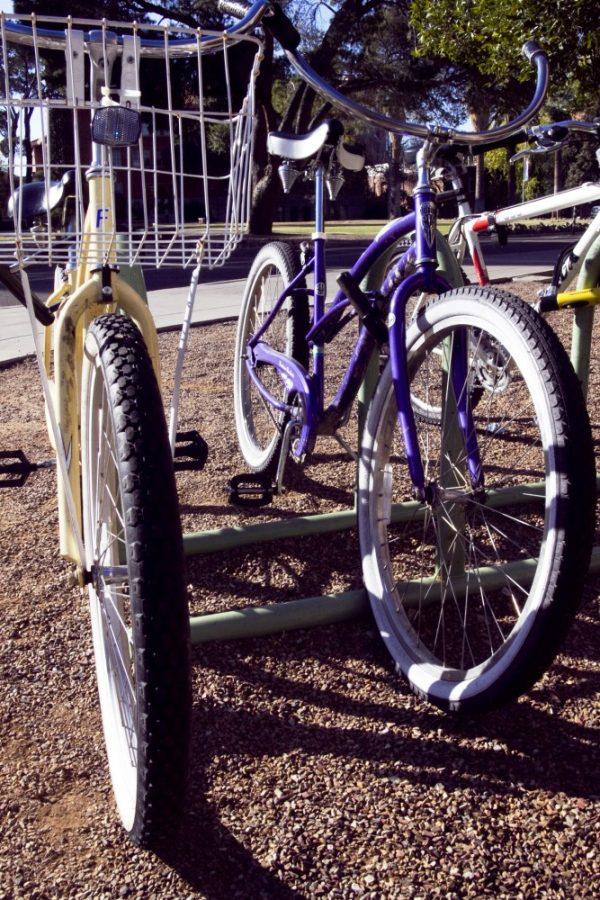While a large decrease in bike theft is due in part to an increase in promoting bike safety and more people locking up, some students still feel more can be done.
The number of bike thefts reported to the University of Arizona Police Department decreased by 65 percent in 2011, according to police records. That year, UAPD logged 251 bike thefts around the UA campus, in comparison to 389 bikes reported missing in 2010 and 427 reported stolen in 2009.
“The decrease can be from more enforcement, people paying more attention or locking up their bikes,” said Sgt. Juan Alvarez, public information officer for UAPD. “We do make arrests for people stealing bikes, but because there are so many bikes in and around campus, it’s always going to be appealing.”
Over the past year, UA’s Parking and Transportation Services along with UAPD have made efforts to promote bike safety and education around campus. David Heineking, director of PTS, said he thinks the decrease in bike theft is due in part to these actions. This includes the introduction of the PTS free bicycle station this semester, which is open every Tuesday and Wednesday on the UA Mall. Developed by PTS, students can visit the station to register their bikes as well as get information on how to properly lock it up when it is not being used.
“At the tent we talk to students about getting good U-Locks, not the chain or wire locks because they are the easiest to break,” Heineking said. “We also teach them how to properly lock their bike, with the frame of the bike in the lock and not just the front tire.”
Students who do not have a U-Lock for their bike can purchase one from UAPD for $15, and all money made from the sales gets reused to purchase more locks. On top of using a well-made lock, Alvarez said students should also register their bikes with PTS so it is more likely for a student to recover their bike if it goes missing.
“It’s important that when a bike gets stolen students have a serial number and a description of the bike,” Alvarez said. “So, in order to do that, we recommend that they register their bike with the Parking and Transportation Services. It makes it much easier to recover the bike and gives the student a better chance to get it back if we find it.”
During the 2010 to 2011 school year, PTS registered more than 900 bikes. This school year, the department has already surpassed this by registering more than 1,300. Students can register their bikes at the PTS office, the Bike Valet located by the Nugent building, the PTS bike station and the UAPD. In addition to registering bikes, students can also use safety programs provided by PTS like paying an annual fee for a bicycle locker and the Bike Valet Program, where students can park and have a PTS student employee watch their bike for free.
“The important thing is if you see anyone acting suspicious around the bike racks, you would give the police department a call,” Heineking said. “If students trusted their instincts and called we can prevent a lot of thefts.”
But for students who have experienced bike theft, like Laura Niverson, a senior studying English, more can be done to prevent future thefts. During her time at the UA, Niverson has had two of her bikes stolen.
The first bike was registered with PTS and went missing at the Cesar E. Chavez building during her sophomore year.
“About a year after I found the bike around the same place it was stolen, (I saw it) chained up, so now someone else is using,” Niverson said. “They had peeled off the register sticker so they could ride it around.”
The second bike was stolen by the Cherry Avenue Parking Garage in May 2011. This bike was also registered with PTS. Niverson said because she had already had a bike stolen, she was even more cautious.
“What made this situation worse was that I had three locks on this bike,” Niverson said.
Because of her experiences, Niverson said she thinks PTS and UAPD can do more to prevent bike theft. One of the things she suggested is reducing the price of bicycle lockers and enclosures to people who register their bikes.
“You go through all the trouble to register the bike and you take care of it, and when it gets stolen you are led to believe the registration will help you get it back but it doesn’t,” Niverson said. “At least make it worth something.”









